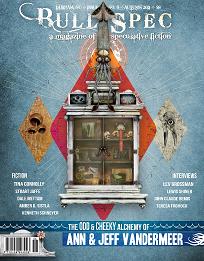 Bull Spec #6, Autumn 2011
Bull Spec #6, Autumn 2011
“Perchance” by Stuart Jaffe
“We Don’t Do Quests” by Dale Mettam
“Selling Home” by Tina Connolly
“Fadeout” by Amber D. Sistla
“Less Than Absent” by Kenneth Schneyer
Reviewed by Jo-Anne Odell
In “Perchance” by Stuart Jaffe, Carrie can’t sleep. Her insomnia is caused by the cacophony of noises made by her husband, Hal. Finally, she decides to stop fighting it, and to forgo slumber altogether. It’s on her third such night she starts to hear voices. Eventually, she traces them to the forest outside their home. In the dark, she ventures out, to find out what the woods conceal.
With a slow pace and little tension, this one failed to draw me in.
“We Don’t Do Quests” by Dale Mettam introduces Jandar and his partner Grau. While drinking cheap wine in a tavern, Jandar makes the rules clear to his prospective new employer. Not only do they avoid quests, they also turn their noses up at evil lords, dragons, trolls and ogres. When Jandar tells the newcomer they don’t do wizards, either, the man gets up to leave. Jandar corrects himself, making it clear he’s aware the fellow is a wizard. They know perfectly well who he is, and what he wants. Jandar also explains a few other things the wizard has failed to consider.
It’s a rough-hewn gem, lacking in polish, but with a clever setup and a satisfying conclusion. Its tongue-in-cheek humor balances the cliché setting.
Penny lives on a multi-level bridge in “Selling Home” by Tina Connolly. She collects scrap to make a living, while babysitting her baby brother, Home, and trying to keep another younger brother, Lark, from the gangs. Jack, an older sibling, has gone to the upper echelons, where he’s a cop. Penny’s life falls apart when both her mother and Lark get into trouble. Taking Home with her, Penny flees. Another girl, Clare, helps her, but Clare has an agenda of her own.
It’s rare to find a story so nicely written that fails so thoroughly. With each sentence, this tale becomes less credible.
In “Fadeout” by Amber D. Sistla, Nathan is desperate to get to the convention center, to see the work of artist-philanthropist Selay before the fadeout paint makes it disappear forever. Nathan’s father won’t let him have the scooter, so Nathan is forced onto the bus. He forces his way through the overcrowded sea of humanity, and makes it just in time, the last person to see the image before it fades. It soon becomes apparent to his father that the image isn’t the only thing that fades.
This story has a great start, but the rest falls flat.
Eddy wants to show his friends the power of his new invention in “Less Than Absent” by Kenneth Schneyer. The Counter is supposed to use a variety of inputs to identify the number of people inside a building. When two men go into the place across the street, the Counter registers their presence. But when an extra fellow comes out, its count doesn’t look so good. Eddy’s skeptical friend, Melissa, scoffs at the idea of there being negative-one man in the building, and goes to have a look.
This tale sets up a good premise, but fails to do anything interesting with it.
This is the first issue of Bull Spec I’ve reviewed. I found it comparable to much of its competition, but the incursion of literary snobbery into speculative fiction has ensured that weak or nonexistent plots abound. Bull Spec is young, and may still be finding its feet, but it’s hard to stand out when you blend in.